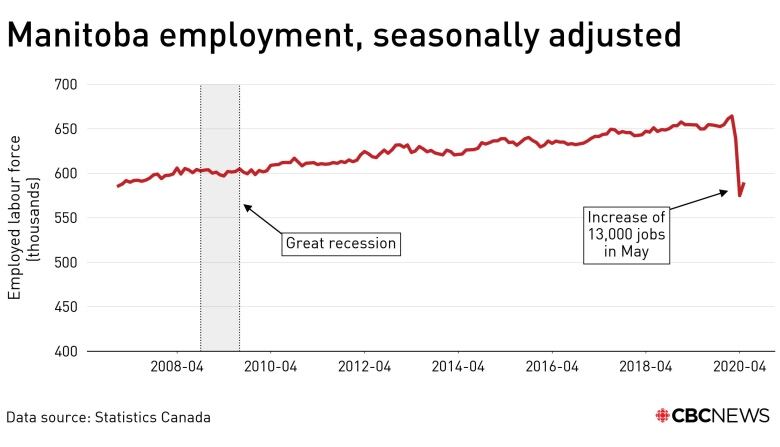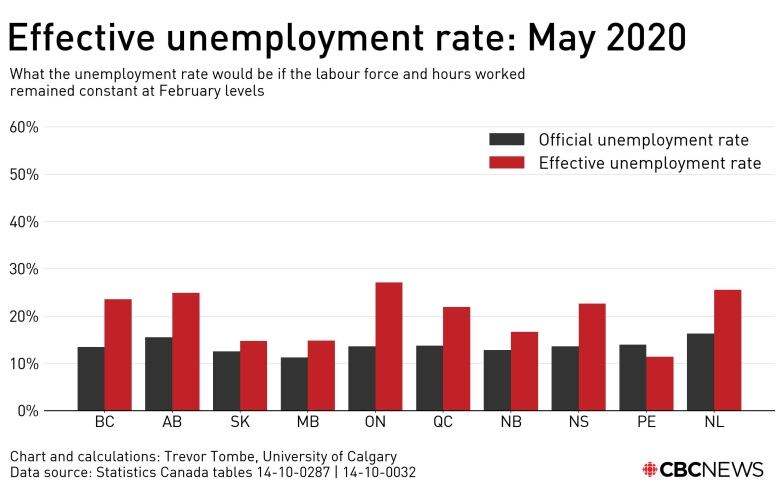Manitoba employment bounces back in May with 13,100 new jobs
Rebound occurred after province reopened economy; gap opens up between men and women

About 13,100 Manitobans went back to work in May after the province eased pandemic restrictions on retail stores, restaurants and other businesses.
After two months of unprecedented job losses, employment rebounded sharply in May,accordingto aStatistics Canada labour force survey conducted during the second week of May and released Friday.
The retail and wholesale sector accounted for 7,000 of those newjobs alone. There were also significant gains made by restaurant and hotel workers, construction workers and people in the information, culture and recreation industries.
Manitoba allowed some businesses to reopen on May 4 and eased restrictions on others the same day.The Statistics Canada survey took place between May 10 and 16.
"That's just when Manitoba was starting to open," said Fletcher Baragar, a University of Manitoba economist, adding it's likely even more jobs have been added since mid-May.
"There'sprobably been some continuation of that as more and more businesses find ways to accommodate the reopening under new conditions and new restrictions."
Manitoba's official unemployment now stands at 11.2 per cent, the lowest in Canada. The effective unemployment rate, which includes people who are not even looking for work because of the pandemic, is 14.8 per cent the second-best rate in country, behindSaskatchewan.
The relatively positive job numbers in the Prairies are due to the low incidence of COVID-19, said Phil Cyrenne, a University of Winnipeg economist.
"There's a strong correlation to a number of cases in the economy, so given that we had relatively few cases, that means the economy here is going to do relatively better," he said.

Most of the Manitobans who got their jobs back, however, earn low wages. Many only came back to work part time, Statistics Canada noted.
"Despite the increase in employment, low-wage workers continue to have a higher share of people working less than half of their usual hours for COVID-19-related reasons, compared with all other paid employees," Statistics Canada stated in its report.
"In Manitoba, as we're loosening things up, you can see that the trend is first of all to increase part-time employment," Cyrenne said.
"You see that markedly in Manitoba: full-time employment is still a little bit lagging. I think there still is a little bit of hesitancy among firms to add full-time employees, but it's sort of a natural response toopening up the economy."

As well, there is a huge gap in Manitoba between men and women over the age of 25. About 6,100 Manitoban men over 25 went back to work in May, compared to just 500 women the same age.
Baragar surmised the gender disparity is due to child-care demands on women.
"Manitoba schools, for example, hadn't reopened at this time and there were problems with daycares as well," he said. "Probably the child-care responsibilities fell disproportionately more on women."

Some sectors of the Manitoba economy saw losses in May. Roughly 2,700 people working in education lost their jobs in May. The utilities sector gas, fuel, heating and irrigation suffered the greatest percentage loss.
Manitoba manufacturing also experienced a modest decline which may only worsen in the coming months, Cyrenne said,due to the high incidence ofCOVID-19 and the resulting economic weakness in Ontario, Quebec and the United States, where many orders emanate.
"No province is an island," he said.
Baragar said small businesses may be in trouble in the coming months, as well.
"I think a lot of businesses have probably been hanging on, going into more debt, extending lines of credit and figuring out how to sort of work and reconfigure," he said.
"How long they may be able to stretch that out and how successful they may be isgoing to be the story."












_(720p).jpg)


 OFFICIAL HD MUSIC VIDEO.jpg)
.jpg)



























































































